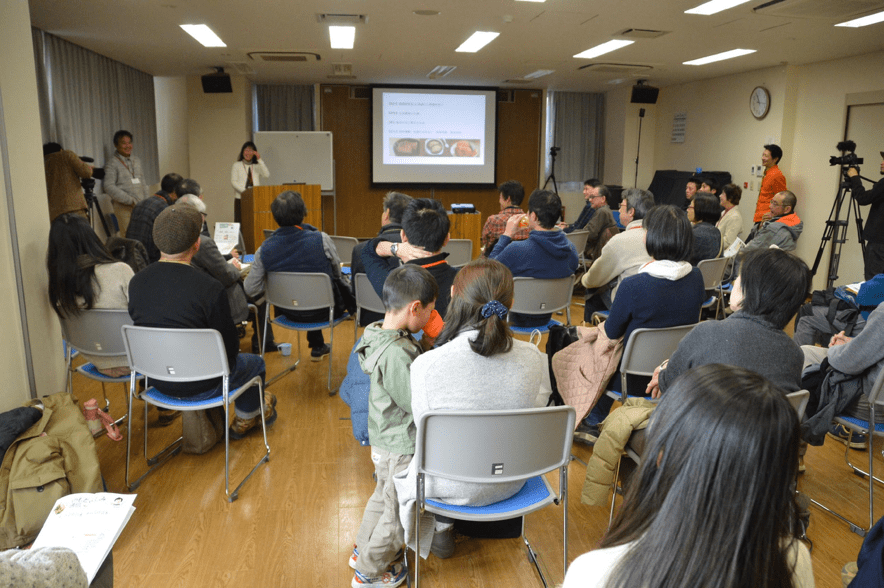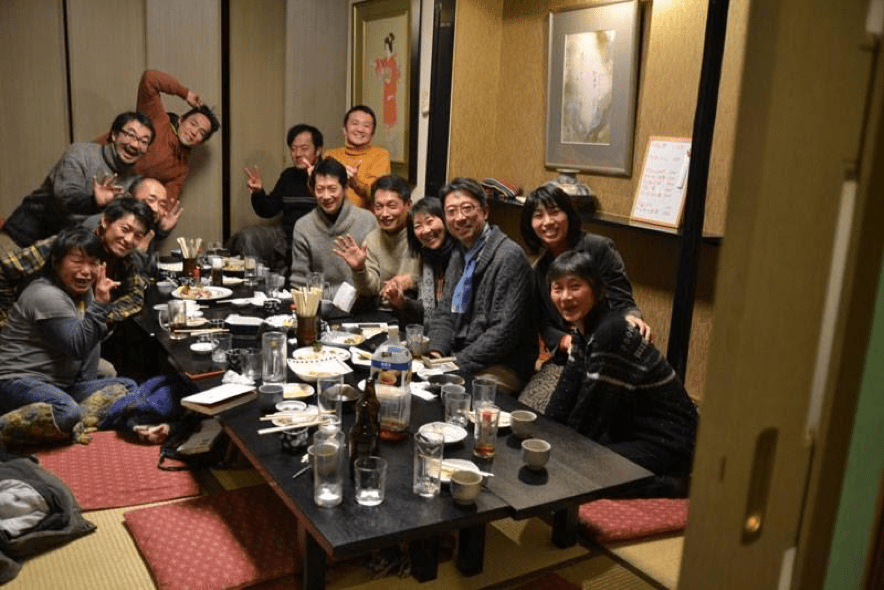Our journey around Transition Japan continues in our Guest Blog series from Shunro Yoshida.
As soon as you get off the train at Fujino station, you’ll see mountains around you and a lake at the foot of the mountains.
Fujino is located in the northernmost part of Kanagawa prefecture. In the old days, many people living here made their living through silk culture and making charcoal.
Since Fujino town was merged into Sagamihara city, the town name of Fujino doesn’t officially exist anymore, but everyone still fondly calls the area Fujino.
Fujino’s location is a little over an hour from the city center, its population is about 9,000 people, and more than half of them moved from other areas.
Originally, residents in Fujino area were bonded strongly. However, it doesn’t mean it’s a closed community. The atmosphere is always welcoming to newcomers, so anyone can live here easily for a long time and feel secure, knowing neighbors in the community. Residents in each village often see each other on the occasions of festivals and environmental maintenance work.
Newcomers started doing interesting things when incoming artists were connecting with each other. Because some painters including Tsuguharu Fujita (Léonard Foujita) evacuated to this area during the war, Kanagawa prefecture started economically developing this town as an art town from the late 1980s.
Through this development, outdoor art pieces were created and big events were held here. Seeing this movement, artists started moving to town and holding fun events themselves.
These artists’ bonds has helped create Fujino’s unique atmosphere which encourages residents to do something fun and new in their lives.
In 1996, NPO Permaculture Center Japan placed its base in Fujino, and in 2005 the Steiner School moved to Fujino, getting a license for an incorporated school.
In 2008, Hide-san (Hidetake Enomoto) also moved to Fujino to start Transition activities.
With Hide-san’s encouragement, people who wanted a down-to-earth life connected to each other and about 10 residents in Fujino voluntarily started Transition activities. A little less than a decade has passed since Transition started here. Many people in this community now have stronger bonds and feel more secure. New people are constantly moving to our town. It’s not a totally sustainable community but I can proudly say that our town has interesting residents and activities. I guess the introduction has gone on too long. Anyway let me introduce some of our activities.
The hottest activity in Fujino is Bio-ichi/vegetable market. It’s a local organic market and opens from 8 to 11 on the 1st and 3rd Tuesday of each month. Renting the restaurant called Hyakusho-no-daidokoro, which is about 10 minutes bus ride from the station, this market has been held for about 2 years.
A DJ plays music from the morning and new farmers in the area display their own organic vegetables. Also, they sell herbs, wild yeast bread, deli foods made of Bio-ichi market’s vegetables, beautiful baked sweets, Japanese sweets, preserved foods, and so on.
Besides such food shops, relaxation and chiropractic spaces are also open.
Everywhere at the market, people meet, chat, and connect. More than 100 visitors come to the market every time. Most of the participants have other main jobs, such as housewife, artist, creator, and self-employed business owner. This market is a chance for them to try small businesses, sell their handmade items, or expand their hobby. We appreciate that the person who makes food and the person who eats it can see each other directly. In such a situation, more and more better things will happen.
You would think that Fujino could have had a market long ago. The person who started is Tsucchi (Takuto Tsuchiya) one of the core members of Transition Fujino. In 2014, he started selling vegetables which his acquaintance made in front of his house, and got a good reputation. Then he had the idea that “it would be interesting if we held an event where farmers who make tasty vegetables and consumers can be directly connected.” That’s how we started this idea.
Moreover, only one supermarket in Fujino has a Bio-ichi vegetable corner now so that anyone can purchase organic vegetables. Residents around the supermarket often go to check this corner, and when most of the vegetables are sold, they let the farmers participating in bio-ichi know through SNS and someone brings more vegetables to the corner. And the person who is checking the vegetables can take old, unsold vegetables. That’s how the system works.
From this year, it is done in cooperation with Sagamihara city and we organized the office system for the market’s operation. The number of participants and customers are both increasing.
藤野駅に降り立った瞬間、やまなみが広がり、麓には湖が目に入ります。
藤野は神奈川県の最北部で、昔は、炭作りや養蚕を生業とする人が多く住んでいました。
相模原市に合併して現在藤野町という地名はなくなりましたが、みなさん親しみを込めてこのエリアを藤野と呼びます。
都心から1時間強、人口は9000人。移住者は半数以上になります。
もともと地域のつながりは強く、かといって閉鎖的ではなく移住者も寛容に受け入れる空気感が、長年にわたって誰もが住みやすく、顔が見えて安心できるコミュニティをつくった要因です。
地元の各集落でも、お祭りや環境整備などで、地域の人が顔を会わせること事が多々あります。
移住者がおもしろいことをはじめたきっかけは、移住してきたアーティストがつながりだしてから。戦時中に藤田嗣治(レオナール・フジタ)など疎開画家が移り住んだことから、1980年後半より、神奈川県が芸術の町として町おこしをはじめました。
野外芸術作品がつくられたり、大きなイベントが開催されたりする様子をみながら、移住してきたアーティストたちが、自分たちでもおもしろいことをやってみようとイベントを開催しはじめました。
このアーティストのつながりが、前衛的で、楽しいことをやって暮らそうという藤野の空気をつくり出してきました。
1996年にNPO法人パーマカルチャー・センター・ジャパンが藤野に拠点をつくり、2005年にはシュタイナー学園が学校法人の資格を得て転居してきました。
2008年に、トランジション活動を始めたいと、ヒデさん(榎本英剛さん)が藤野に引っ越してきました。
ヒデさんの呼びかけによって、地域を意識して地に足がついた暮らしをしていきたいという考えを持っている人がつながり、藤野で10数人が手を挙げ活動をはじめました。活動から10年弱。さまざまな化学変化がおこり、地域のつながり、安心感が高くなったと感じます。移住者もあとをたちません。まだまだ持続可能とまではいきませんが、おもしろい人や活動があるまちと自負できます。
前置きがながくなりましたが、そのいくつかをご紹介します。
今、藤野でいちばんHOTなのが、ビオ市/野菜市です。
地元のオーガニックマルシェ。毎月第1、第3火曜日の8時から11時。駅からバスで10分の百笑の台所というレストランをお借りして、約2年つづいてきました。
朝からDJが音楽を流し、周辺の新規就農者が自慢のオーガニックな野菜を並べています。ハーブ、天然酵母のパン、ビオ市に出店する野菜を使ったお惣菜、美しい焼き菓子、和菓子、保存食などが並びます。
となりのスペースでは、整体やリラクゼーションでからだを整えられます。
あちこちで、話に花が咲き、出逢いが生まれ、人がつながってゆきます。
毎回100人以上が会場に訪れます。
この場に参加している方のほとんどが、主とする仕事をもっています。主婦だったり、アーティスト、クリエイター、自営業など。
小商いをしてみたい、手作りしたい、趣味を生かしたい、そんな一歩になっています。
つくっている人と食べる人が顔を見合う事をとても大事にしています。そこで、どんどん相乗効果が生まれるのです。
いままで藤野にありそうでなかったマルシェ。仕掛け人はトランジション藤野のコアメンバー、つっちー(土屋拓人さん)。2014年から自宅前で知り合いの農家が作る野菜を販売したところ評判が良く、「おいしい野菜を作る農家と消費者を直接結び付けるイベントをしたら面白いのでは」と思いつき、はじめました。
さらに、藤野に1軒のみのスーパーにもビオ野菜のコーナーが設けられて、いつでもオーガニックな野菜が購入できるようになりました。スーパーの近所に住んでいる人がたびたび様子を見に行って、少なくなったらSNSでビオ市に参加している生産者に知らせて、誰かが店頭に商品を持って行く。古くなった商品は在庫管理している人がいただく。という仕組みで動いています。
今年から、相模原市との市民恊働事業となり、事務局の体制を整えて運営がはじまりました。出店者もお客さんもますます増えています。
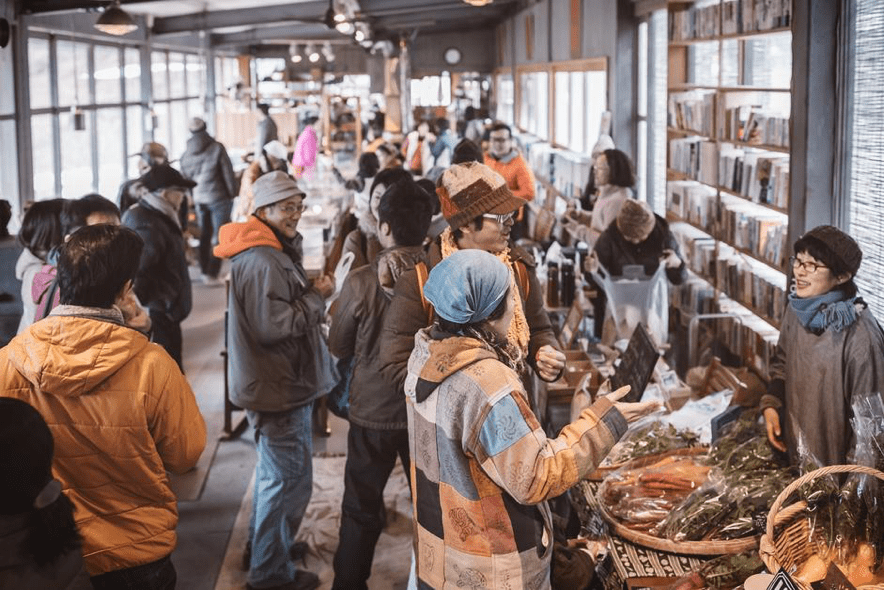
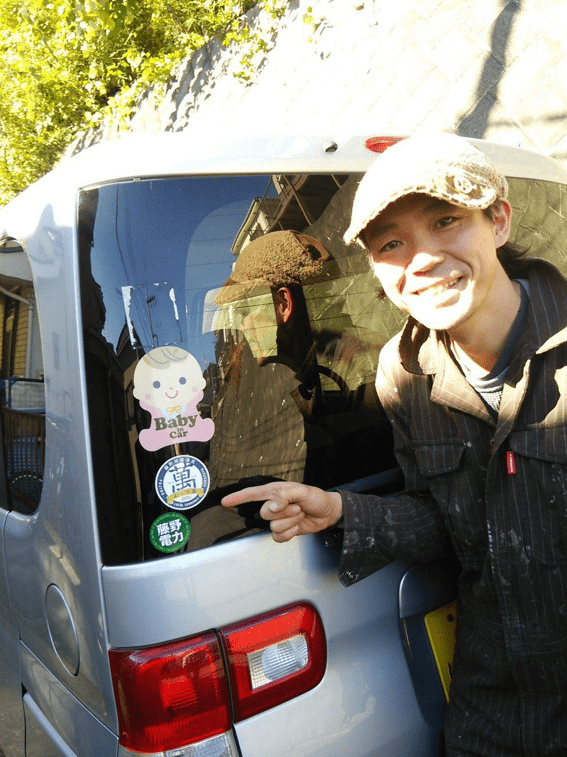
I think the base of this network is a local currency “Yorozu-ya.” In Fujino, 15 people started a trial introduction of this system around September, 2009. And on April, 2010, we officially launched it. Originally we introduced this system, referring to Awa-money started in Kamogawa as a sample case. This local currency is a network to support one another.
Introducing L.E.T.S (Local Exchange Trading Scheme), we write down an exchange in the balance record book. Years later, when we read this balance record book, it becomes like our memorial diary. By e-mail or other method, you can state what kind of help you need or what you want to give away. And someone who can help you or wants your item contacts you for a deal. The price can be set after negotiation. If an actual fee is necessary, actual Yen can be used, as well. Of course, barter exchange is OK.
When the deal is set, you need to send a report e-mail, like “We were able to do xxxx. Thank you” to everyone. Readers now know everything is ok and feel this is a good community, seeing “thank you” expression in the e-mail.
Even when you’re in trouble, someone who can help you is around you. It’s a communication tool with a lot of potential to give people secure feelings.
The more you use it, the more value the local community can create.
Currently about 450 participants are registered. It’s also a great place to exchange local information. When the Great East Japan Earthquake occurred and many people couldn’t go outside, feeling endangered, we could get information through e-mail exchanges and cheer each other up.
これらのネットワークの基盤になったのが、地域通貨よろづ屋だと考えています。藤野では、2009年9月頃から話がはじまって15人でスタート。2010年の4月から正式にスタートしました。もともと鴨川ではじまっていた安房マネーを見本にしてはじめました。
この地域通貨はお互いさまのネットワーク。
L.E.T.S(Local Exchange Trading Scheme=LETS)方式を使っていて、そのやりとりを通帳に記入します。この通帳はふりかえると想い出の日記帳にもなります。
メールなどで、手伝って欲しいことや、譲りたいものなどを発信して、できるよ、ほしいという人がその人に連絡して取引をしてもらう。値段はお互いに話しあって決めてもらい、実費がかかる場合は円との併用もOK。もちろんブツブツ交換でもOK。
取引が成立したら、事後報告メールをだしてもらいます。
「〜ができました。ありがとうございました。」
というメールがみんなに届く。ああ、よかった、と同時に、ありがとうということばを見るだけで、いいコミュニティだなとみんなが感じます。
困ったときには助けてくれる誰かが近くにいる、そんな安心感を持つことのできる、様々な可能性のあるコミュニケーションのツールなのです。
使えば使うだけ、地域に何かしらの価値が生まれていきます。
現在、登録者は約450人。地域の情報を交換する場にもなっていて、東日本大震災の時にも不安で外に出られない時に、メールのやりとりで情報を得たり、励まし合えたりしました。
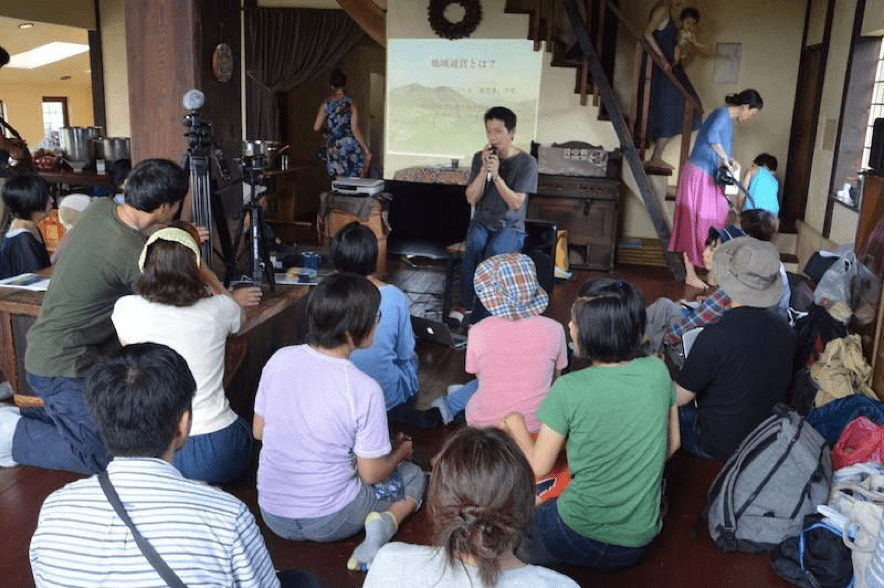
As introduced at “intransition 2.0,” Fujino-denryoku (Fujino Electric Power) decided to stick to “off-grid” and try self-supporting energy. So we started holding a workshop for generating electricity by connecting 50w small solar panels to a battery, a charge controller, and an inverter. We have held the workshop more than 200 times all over Japan.
Takahama-kun who moved to Fujino and joined Fujino-denryoku last year is now working on delivering used PCs to developing countries. He has also started delivering an in-house power generation workshop and its devices. Fujino-denryoku electric power has started being delivered to the Philippines and Africa.F
intransition2.0でも紹介があった藤野電力は、その後、オフグリッドにこだわり、エネルギーの自給をやってみようと、50wくらいの小さなソーラーパネルとバッテリー、チャージコントローラー、インバーターなどにつないで電気を作ってみるというワークショップを開催するようになりました。ワークショップの開催も200回を超え、全国各地で開催しました。
昨年藤野に移住して藤野電力に参加し始めた高濱くんは、途上国に教育のために中古パソコンを届ける活動をしています。パソコンだけではなく、このワークショップと自家発電するための機材を届ける活動も始めました。
フィリピンやアフリカに藤野電力を届けることがはじまっています。
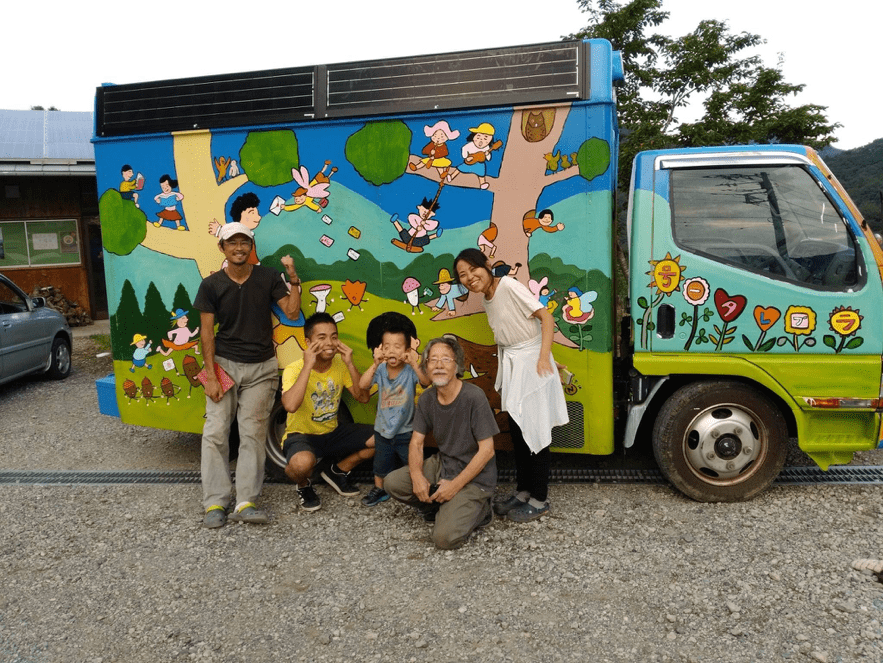
In Fujino, I think Transition town activities created an atmosphere where local residents can easily raise their hands and say “I want to do this!”
At the beginning of this year, we arranged a place where people can present what they want to do locally and ask for support. In total, 20 people made a presentation.
With Yorozu network as a base, this community has lots of events and chances to see each other, and more and more projects are starting. Feeling the bond with others, people feel like talking to others instead of keeping everything to themselves.
“Do whatever and whenever you want to, as much as you want.” Always having fun, not trying too much, and not doing things that are impossible. But when it is fun, keep doing it. Fujino is the place where people can do fun things sometimes seriously and sometimes in a relaxing way.
藤野では、トランジションタウンの活動が、地域に住んでいる人が手をあげて、こんなことやりたい!と言い出しやすい土壌をつくったのではないかと思っています。
今年の年頭に、地域でやりたいことプロジェクトを発表して、応援を呼びかける場をつくったところ、全部で20名の発表がありました。
よろづのネットワークがベースとしてあり、イベントが多く、顔を合わせることが多い地域で、プロジェクトがどんどん広がっていきます。人のつながりが感じられて、自分ひとりで抱えるよりもやってみよう、相談してみようという気持ちが膨らみます。
「やりたいことを、やりたいときに、やりたいだけ、やる」楽しいことから離れずに、無理せず、できないときにはやらない。楽しい時にはどんどんやる。
ゆるくて、本気で楽しいことをやる空気が藤野にあります。
